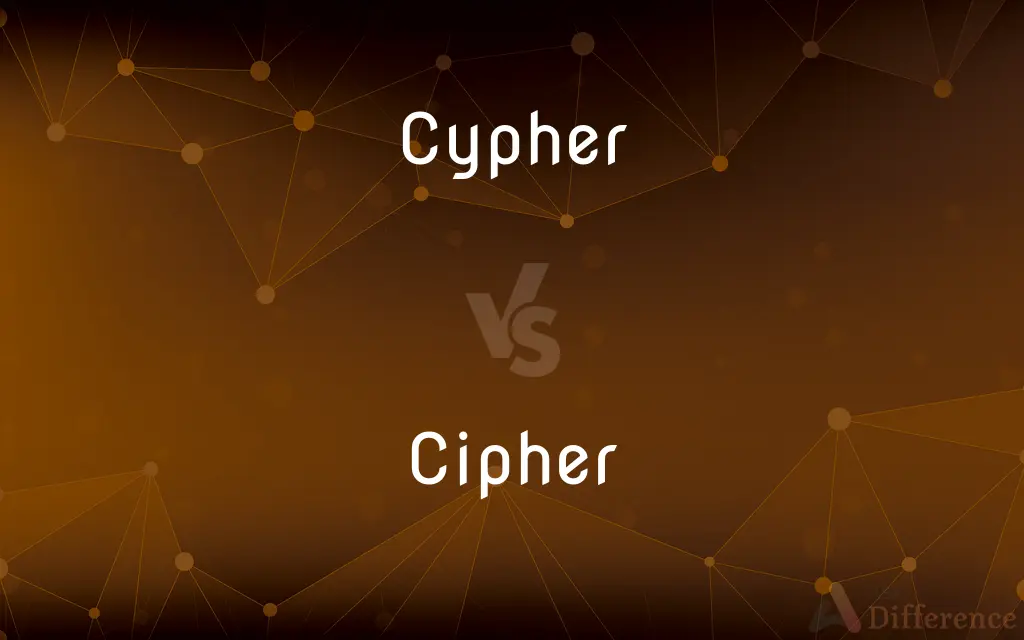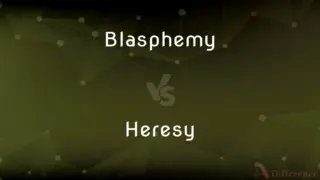Cypher vs. Cipher — What's the Difference?
Edited by Tayyaba Rehman — By Fiza Rafique — Updated on March 22, 2024
Cypher and cipher are alternate spellings of the same term, referring to algorithms for encryption or decryption. However, "cypher" is less commonly used in modern contexts.

Difference Between Cypher and Cipher
Table of Contents
ADVERTISEMENT
Key Differences
Both "cypher" and "cipher" refer to the concept of transforming information to secure its contents from unauthorized access, primarily through encryption and decryption methods. The choice between "cypher" and "cipher" often comes down to regional preferences or historical context, with "cipher" being the more prevalent spelling in contemporary usage. This usage reflects not only a consistency in spelling across technical and cryptographic communities but also aligns with standardized terminology in the fields of information security and digital communication.
In historical contexts, "cypher" was more commonly used in English literature and documents, reflecting older spelling conventions. On the other hand, "cipher" has become standardized in most modern contexts, especially in technical, mathematical, and computing fields. This shift underscores the evolution of language and terminology alongside advancements in technology and the increasing significance of cryptography in digital security.
The functions associated with both cyphers and ciphers involve algorithms or methods that encrypt plaintext into ciphertext, making the information unreadable without the appropriate key. While their fundamental purpose remains unchanged, the specific techniques and algorithms have evolved, ranging from simple substitution ciphers to complex cryptographic systems used for securing digital communications. This evolution highlights the continuous development of encryption technologies to meet the demands of modern security challenges.
Despite the differences in spelling, the applications of cyphers and ciphers extend beyond traditional secret communication. They are integral to ensuring the confidentiality, integrity, and authenticity of information in various domains, including internet communications, financial transactions, and secure access systems. This broad application spectrum demonstrates the critical role of cryptographic techniques in contemporary digital infrastructures.
Regardless of the spelling, the study and application of cyphers or ciphers encompass a wide range of disciplines, including mathematics, computer science, and electrical engineering. This interdisciplinary approach underlines the complexity and importance of cryptography in safeguarding information in an increasingly digital world. The choice of spelling does not affect the understanding or application of cryptographic principles but may reflect regional or historical linguistic preferences.
ADVERTISEMENT
Comparison Chart
Spelling Variance
Older, less common spelling
More commonly used in modern contexts
Usage Context
Historical documents, literature
Technical, mathematical, computing fields
Purpose
Encryption and decryption
Encryption and decryption
Evolution
Reflects older language conventions
Aligned with contemporary terminology and technology
Application Fields
Cryptography, secret communication
Cryptography, digital security, computing
Compare with Definitions
Cypher
A person or thing of no importance.
In the vast bureaucracy, he felt like a mere cypher.
Cipher
A secret or disguised way of writing; a cryptographic algorithm.
Modern encryption relies on complex ciphers to secure digital communications.
Cypher
A method of secret writing using substitution or transposition.
Ancient messages were often written in a cypher to conceal their meaning.
Cipher
Something or someone of no value or importance.
He dismissed the criticism as the opinions of a cipher.
Cypher
A secret or disguised way of writing; a code.
The spy communicated using a complex cypher that enemies couldn't decode.
Cipher
A method for transforming text to secure its contents from unauthorized access.
The company's emails are protected with a state-of-the-art cipher.
Cypher
A system of symbolic notation.
Musicians sometimes use a cypher to quickly jot down melodies.
Cipher
A zero; a numerical symbol.
In ancient numbering systems, the introduction of the cipher was revolutionary.
Cypher
To solve problems in arithmetic.
Students were taught to cypher complex equations before calculators became widespread.
Cipher
To perform arithmetic calculations.
Before digital calculators, scientists would cipher calculations by hand.
Cypher
Variant of cipher.
Cipher
In cryptography, a cipher (or cypher) is an algorithm for performing encryption or decryption—a series of well-defined steps that can be followed as a procedure. An alternative, less common term is encipherment.
Cypher
Alternative spelling of cipher
Cipher
The mathematical symbol (0) denoting absence of quantity; zero.
Cypher
Alternative spelling of cipher
Cipher
An Arabic numeral or figure; a number.
Cypher
See Cipher.
Cipher
One having no influence or value; a nonentity.
Cypher
A mathematical element that when added to another number yields the same number
Cipher
A cryptographic system in which units of text of regular length, usually letters, are transposed or substituted according to a predetermined code.
Cypher
A quantity of no importance;
It looked like nothing I had ever seen before
Reduced to nil all the work we had done
We racked up a pathetic goose egg
It was all for naught
I didn't hear zilch about it
Cipher
The key to such a system.
Cypher
A person of no influence
Cipher
A message written or transmitted in such a system.
Cypher
A secret method of writing
Cipher
A design combining or interweaving letters or initials; a monogram.
Cypher
A message written in a secret code
Cipher
To solve problems in arithmetic; calculate.
Cypher
Convert ordinary language into code;
We should encode the message for security reasons
Cipher
To put in secret writing; encode.
Cypher
Make a mathematical calculation or computation
Cipher
To solve by means of arithmetic.
Cipher
A numeric character.
Cipher
Any text character.
Cipher
A combination or interweaving of letters, as the initials of a name.
A painter's cipher
An engraver's cipher
Cipher
A method of transforming a text in order to conceal its meaning.
The message was written in a simple cipher. Anyone could figure it out.
Cipher
(cryptography) A cryptographic system using an algorithm that converts letters or sequences of bits into ciphertext.
A public-key cipher
Cipher
Ciphertext; a message concealed via a cipher.
The message is clearly a cipher, but I can't figure it out.
Cipher
A grouping of three digits in a number, especially when delimited by commas or periods:
The probability is 1 in 1,000,000,000,000,000 — a number having five ciphers of zeros.
Cipher
(music) A fault in an organ valve which causes a pipe to sound continuously without the key having been pressed.
Cipher
A hip-hop jam session.
Cipher
(slang) The path (usually circular) shared cannabis takes through a group, an occasion of cannabis smoking.
Cipher
Someone or something of no importance.
Cipher
(dated) Zero.
Cipher
To calculate.
I never learned much more than how to read and cipher.
Cipher
(intransitive) To write in code or cipher.
Cipher
Of an organ pipe: to sound independent of the organ.
Cipher
(obsolete) To decipher.
Cipher
A character [0] which, standing by itself, expresses nothing, but when placed at the right hand of a whole number, increases its value tenfold.
Cipher
One who, or that which, has no weight or influence.
Here he was a mere cipher.
Cipher
A character in general, as a figure or letter.
This wisdom began to be written in ciphers and characters and letters bearing the forms of creatures.
Cipher
A combination or interweaving of letters, as the initials of a name; a device; a monogram; as, a painter's cipher, an engraver's cipher, etc. The cut represents the initials N. W.
Cipher
A private alphabet, system of characters, or other mode of writing, contrived for the safe transmission of secrets; also, a writing in such characters.
His father . . . engaged him when he was very young to write all his letters to England in cipher.
Cipher
Of the nature of a cipher; of no weight or influence.
Cipher
To use figures in a mathematical process; to do sums in arithmetic.
"T was certain he could write and cipher too.
Cipher
To write in occult characters.
His notes he ciphered with Greek characters.
Cipher
To get by ciphering; as, to cipher out the answer.
Cipher
To decipher.
Cipher
To designate by characters.
Cipher
A message written in a secret code
Cipher
A mathematical element that when added to another number yields the same number
Cipher
A quantity of no importance;
It looked like nothing I had ever seen before
Reduced to nil all the work we had done
We racked up a pathetic goose egg
It was all for naught
I didn't hear zilch about it
Cipher
A person of no influence
Cipher
A secret method of writing
Cipher
Convert ordinary language into code;
We should encode the message for security reasons
Cipher
Make a mathematical calculation or computation
Common Curiosities
Which spelling is more common in cryptographic contexts?
"Cipher" is more commonly used in modern cryptographic and technical contexts.
Can both terms refer to encryption algorithms?
Yes, both terms are used to describe algorithms for encryption and decryption.
Are cypher and cipher interchangeable?
Yes, they refer to the same concept but differ in spelling preference.
Do the terms have applications outside of cryptography?
Yes, they can refer to symbolic notations, mathematical calculations, or figuratively to something of no importance.
Are ciphers only used for secretive purposes?
Primarily, though they also play a crucial role in securing legitimate communications and data.
Is one spelling preferred over the other in certain regions?
While preferences may vary, "cipher" is universally recognized in technical and international contexts.
How have the applications of ciphers evolved over time?
From simple manual encryption methods to complex algorithms used for digital security.
Can ciphers be simple or are they always complex?
They range from very simple to highly complex, depending on the intended security level.
Has the digital age affected the use of ciphers?
Yes, the digital age has significantly increased both the complexity and importance of ciphers for securing electronic communications.
Is there a difference in usage between historical and contemporary contexts?
Historically, "cypher" was more common, whereas "cipher" is prevalent in contemporary contexts.
Can either term refer to a person of no significance?
Yes, both can be used metaphorically to describe someone considered insignificant.
Are there any famous ciphers in history?
Yes, historical ciphers like the Caesar cipher and Enigma machine are well-known examples.
How does one choose between using cypher or cipher?
The choice often depends on regional spelling conventions or the context of the writing, with "cipher" being the preferred term in technical and contemporary writings.
Do modern ciphers require special knowledge to create or use?
Creating secure ciphers requires specialized knowledge in cryptography, but many ciphers can be used with basic instructions.
Can ciphers be cracked?
While some ciphers can be cracked with enough time, resources, and expertise, modern encryption techniques are designed to be extremely secure against unauthorized decryption.
Share Your Discovery

Previous Comparison
Blasphemy vs. Heresy
Next Comparison
Mining vs. QuarryingAuthor Spotlight
Written by
Fiza RafiqueFiza Rafique is a skilled content writer at AskDifference.com, where she meticulously refines and enhances written pieces. Drawing from her vast editorial expertise, Fiza ensures clarity, accuracy, and precision in every article. Passionate about language, she continually seeks to elevate the quality of content for readers worldwide.
Edited by
Tayyaba RehmanTayyaba Rehman is a distinguished writer, currently serving as a primary contributor to askdifference.com. As a researcher in semantics and etymology, Tayyaba's passion for the complexity of languages and their distinctions has found a perfect home on the platform. Tayyaba delves into the intricacies of language, distinguishing between commonly confused words and phrases, thereby providing clarity for readers worldwide.
















































